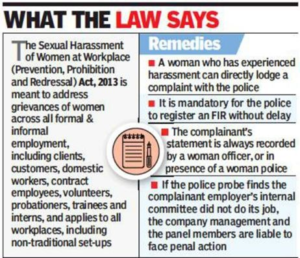In news- Recently, a petition has been filed in the Supreme Court challenging guidelines issued by the Bombay High Court in cases under the Protection of Women from Sexual Harassment (POSH) Act.
About the guidelines-
- The guidelines were formed by Justice G.S. Patel of the High Court ostensibly to protect the identities of the parties in a case under the POSH Act.
- The guidelines mentioned a slew of guidelines related to conducting hearings, passing and uploading of orders, and reportage on cases of sexual harassment of women at workplaces, and made it clear that such cases can be either heard “in-camera” or in the judge’s chamber, and no reporting without the nod of the judge will be permitted.
- The court had observed that any breach of these directions would amount to contempt of court.
- The plea in the top court challenged the high court’s decision, terming the directions a “death blow” to the freedom of speech and expression enshrined under Article 19.
About POSH Act 2013-
- The Sexual Harassment of Women at Workplace (Prevention, Prohibition and Redressal) Act, 2013, commonly referred to as the ‘PoSH Act’ is an extension of Vishakha Guidelines, 1997, introduced by the Supreme Court (in Vishakha and others v State of Rajasthan) which had laid down guidelines for dealing with sexual harassment at workplace, pending formal legislation.
- The PoSH Act has been implemented with an aim to prevent and protect women from sexual harassment at the workplace and thereby ensure a safe working environment for women.
- Section 2(n) of the Act defines sexual harassment to include the following unwelcome acts:
- Physical contact and sexual advances
- A demand or request for sexual favours
- iii. Making sexually coloured remarks
- Showing pornography
- Any other unwelcome physical, verbal or non-verbal conduct of sexual nature
- The Act also covers concepts of ‘quid pro quo harassment’ and ‘hostile work environment’ as forms of sexual harassment if it occurs in connection with an act or behaviour of sexual harassment.

- As per the Act, an ‘aggrieved woman’ in relation to a workplace, is a woman of any age, whether employed or not, who alleges to have been subjected to any act of sexual harassment.
- The POSH Act applies to both the organized and unorganized sectors in India.
- The PoSH Act requires every company having more than 10 (ten) employees to constitute an Internal Complaints Committee (ICC) in the prescribed manner in order to receive and address the complaints of any sort of sexual harassment from women in a time-bound and extremely confidential manner.
- If an employer fails to either constitute an ICC or discharge any of the other duties placed upon them under the act, they shall be punished with a fine.
- It also provides for constitution of the Local Committee in every District which is responsible for hearing and redressing complaints of sexual harassment from workplaces that may have fewer than 10 employees.
- The PoSH Act takes into cognizance, false and malicious complaints and provides for strict action against them.
















